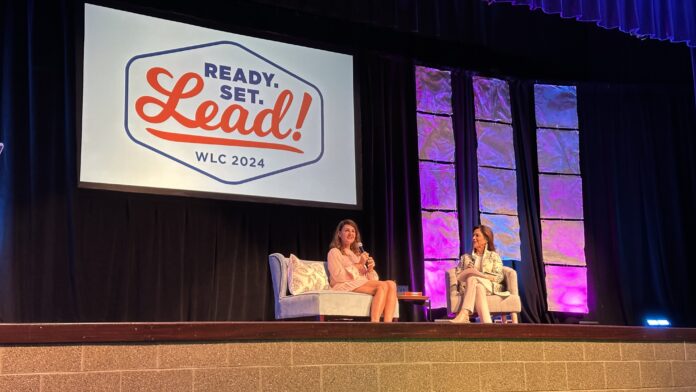
Nia Vardalos – the woman behind the “My Big Fat Greek Wedding” franchise – was the closing act Thursday, Nov. 7, in the equally big, fat 2024 Women Lead Change (WLC) Conference that attracted more than 650 women to the Waterfront Convention Center.

Paralympic swimmer Mallory Weggemann shares her story of challenge and triumph with more than 650 women at the Nov. 7 Women Lead Change Quad Cities Conference. CREDIT KENDA BURROWS
The celebrated playwright, actress, best-selling author and mother, left the WLC crowd in downtown Bettendorf laughing following an often-moving day that also featured advice from local women leaders and an inspiring presentation by Paralympic swimmer Mallory Weggemann.
In her closing remarks, Tiffany O’Donnell, WLC’s chief executive officer, thanked all who came to a conference focused on “workforce development through a gender lens.” And she thanked the speakers, presenters, sponsors and emcee Micaela Booth, executive director of John Deere Classic’s Birdies for Charity.
“We know our workplaces look different today than they did last year, two years, and certainly five years ago, let alone 17 years ago, when we first started,” Ms. O’Donnell said of the Cedar Rapids, Iowa-based WLC organization. “We just really hope that you will leave today, educated, challenged and inspired.”
She also urged the WLC crowd to mark their calendars for the Nov. 12, 2025, Quad Cities annual conference.
During an entertaining Q&A led by Ms. O’Donnell, Ms. Vardalos shared a message of women-helping-women empowerment that was heavily sprinkled with the humor that helped her first “Big Fat Greek Wedding” film become the No. 1 romantic comedy of all time. She also received academy award nominations for original screenplay and best actress and the film spawned two sequels, and though Ms. Vardalos isn’t planning a fourth film, she would not rule it out.
Family informs her work
Ms. Vardalos grew up in Winnipeg, Canada, which she said is very similar to the Quad Cities, in a large, loud, loving, Greek family that really does inform her creative efforts.
“I always say, my whole family is funny and I’m the only one making a profit off of it,” she said.
Relatives are, however, involved in the process from living the belly-laugh moments that punctuate her films, to the filmmaking itself. Her mother even reads all her materials, though Ms. Vardalos doesn’t always take her direction.
After reading the first film script, for example, Ms. Vardalos said her mother told her two things. “I am not a fan of the scene that showed premarital sex” and “I don’t think you should tell that story about Aunt Voula” who was inspired by the Vardalos’ kids real aunt who actually had a lump on the back of her neck and she claimed it was her twin.
It went in as did her father’s belief in Windex as a cure-all after he washed a windshield with the product and a wart on his hand disappeared.
It’s hard not to be inspired to write comedy, she said, “when you grow up with nuggets like that.”
Ms. O’Donnell reminded Ms. Vardalos that her “Big Fat Greek Wedding” was both the highest grossing independent films of all time and “top romantic comedy in history.” Ms. Vardalos replied, “It is really something. And this is why I wanted to come today and why I like to tell my story because I am not writing movies to break records. If you do that, artistically you are bereft of any heart or soul. What you have to do, I think, is to set out to empower yourself and tell your story.”’
Don’t let others stop you
That’s especially true when others try to stop you. That includes the agent who baldly told Ms. Vardalos, “You’re not pretty enough to be a leading lady and you’re not fat enough to be a character actor.” Then, after learning that Ms. Vardalos was Greek, the agent added “That’s a problem, you’re not a physical minority; you’re not white; you’re not Asian and you’re not Black. I can’t get you any work.”
Ms. Vardalos added “When someone tells you something really searingly honest, you have two choices, you can be victimized or you can be empowered.” She made her choice when she decided to turn the “problem” of being Greek into the “solution” by making a list of those family stories she had been telling for years including her aunt’s lump and weaving them into a screenplay which she also copyrighted.
Then, Ms. Vardalos said, “I jumped on stage and started telling the story in an effort to get an agent to get a film made. The agents never came. But Tom Hanks and Rita Wilson came because, lucky me, Tom Hanks had been baptized in the Greek church in order to marry Greek Rita Wilson and they came to the show.”
Afterward the couple came backstage and Ms. Wilson told Ms. Vardalos “I love you,” and said the play should be made into a movie. Ms. Vardalos handed the couple her screenplay. Later Mr. Hanks called and said, “We have read your screenplay and we have formed a company called Playtone and we would like to make your movie our first movie.” Ms. Vardalos said she responded, “Well, Tom, I would like to play the bride and I think I meant to say a cousin but something in me heard my mom say, ‘Why not you?’”
Writer thanks audience
The couple, of course, began looking for the independent financing the film needed. Two years later, Ms. Vardalos said, “Suddenly we were filming and suddenly we were out and all of you who went to the film, and thank you so much.”
None of that would have happened if Ms. Vardalos had not invested in herself by securing a theater and hiring a stage manager to produce her play and get it “in front of Rita Wilson and Hanks’ eyes.”
She urged the WLC crowd to similarly invest in themselves whatever their dreams are. In addition, she said, “We can also find ways to invest in ourselves by pooling our financing together with other women, like finding a way to invest in our futures by finding a way to do things together. Which is why I love seeing so many women together.”
She also shares the advice she recently gave her daughter when she entered college.
“Look around and find your own colleagues because you will create together, you will write together, you will make films together with the people that grew up with or made friends” at events such as the WLC conference.
Ms. Vardalos, for example, is among a still-small group of filmmakers in Hollywood who focus on making films starring women. “I write a woman as a lead constantly because no one is going to do it for us. It’s very difficult to find people to write women as the lead as studies have shown, we like to see ourselves reflected on the screen.”
She also told the women not to be influenced by those who dismiss them.
Be enough for yourself
“It is difficult to persevere when you have been told things that you’re never young enough, you’re never old enough, you’re never fit enough, you’re never pretty enough.’ We’re never enough. So we have to be enough to ourselves. We have to constantly say to ourselves, ‘It’s OK.’”
For her, it helped that “I was raised in a family where body didn’t matter. It was: Be healthy, be happy, be funny, be smart, get educated.”
She also urged women to be involved in their communities.
In addition to movies and plays, Ms. Vardalos is the author of a book about her long and difficult path to motherhood. She had hoped to have a biological daughter, she said but “chose adoption because nature had other plans for me.”
It was a difficult time trying to conceive and a difficult transition to mothering a child who was 3 when she arrived at her home, which Ms. Vardalos details in her New York Times bestselling book called “Instant Mom.”
“Now I am so grateful that I didn’t have a biological child because I wouldn’t have found my real child who is my daughter who I met when she was almost 3 through American Foster Care.”
She shares that joy by donating 100% of the proceeds from that book to a trio of adoption charities thus has helped 2,000 kids find permanent homes.




